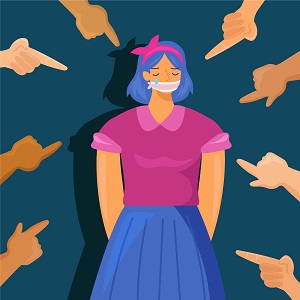
“Soundaryam Sarikku vinayayi,” – “Sari’s beauty became her curse.”
This headline, along with the picture of a girl, hardly 17 years old, in one of the major Malayalam newspapers is still fresh in my memory. Equally fresh is the loud laughter I heard from my mother and some other female relatives who read out this headline that was part of the extensive coverage of the notorious Kiliroor sex racket bust.
Suryanelli, Vithura, Kiliroor, Kaviyoor – these are all names of small towns in Kerala. But to Keralites, these are names associated with highly sensationalized, sex racket busts that happened in Kerala over the years when I was growing up. Just a few names out of many, to be clear. Decades later, the cases, which had even prominent public figures in the accused list, have become distant memories to many. And except for a few accused who have been convicted, the rest lead a life devoid of any consequences. Hardly anyone thinks of what the victims and their families do now, how they have coped with the trauma and what their lives must have been like.
I don’t know if it’s because these incidents were daily headlines for most part of my childhood or because most of them coincided with the long period of sexual abuse that I encountered as a child, I think of the victims quite often, even now. And every time I think of these, the first thing that comes to my mind is laughter. Yes! Laughter! The same laughter I heard from the women in my life as they mocked the victim of the Kiliroor case – a young girl who gave birth to a baby and died.
While Suryanelli and Vithura were cases that happened when I was very young, smack in the middle of my own miserable days of dealing with sexual abuse, the Kiliroor case happened in 2003 when I was just finishing school and starting college. Obviously, I was old enough to comprehend the gravity of the case and its implications more. Not only was I following the news actively, I was also listening to the conversations around the case between elders in my life – about the victim, the culprits and a general commentary on similar cases, including the predecessors like Suryanelli and Vithura cases.
“This girl??!!” They laughed as they read the headline, which to them was a joke. In fact, this headline went on to become a running joke, used whenever they wanted to make fun of someone’s looks. They went on to discuss how this “ugly” girl going around to meet men to become an actress was even more a joke, how she had slept around for offers with her parents’ knowledge, how giving her family any financial aid to raise the baby she had left behind was wrong as her sleeping around and making a baby was no one else’s fault and so on and so forth.
This victim-shaming was their and everyone else’s go-to comment when they talked about Suryanelli, Vithura and every other case of the same kind. “The girl ran away with some bus conductor. No wonder this happened.” “Why are the parents crying now after they let all this happen?” Mind you, it was little girls of just 15 or 16 that they were talking about with such venom in their minds and words.
All this was just a few years after I had finally learnt to resist the predators who hunted and haunted me for years, putting an end to the abuse. But I was still dealing with the denial and lack of acknowledgment of my trauma from my own mother after I had brought myself to tell her about the first instance of abuse, just the tip of the iceberg. I could never bring myself to talk about the others. You could probably understand why when I say that despite finding some courage at 16 and telling my mother the truth about the first predator, his gift to my parents – a teapot in the shape of a British village cottage – is still proudly displayed at my parents’ house.
As I listened to this exchange, I knew that there was no point in expecting compassion, let alone justice from anyone – not even from women, not even from my own mother. If these girls who were raped and gangraped over and over again for months at a time, by perverts the age of their dad and grandfather, were being slut-shamed, what hope do others have? I wrapped my head around the fact that if ever my mother came out of her denial mode, I would also be one of the girls who “let it happen.” I consoled myself saying that maybe denial is better than slut-shaming. And at that moment, I knew why I never opened up about the abuse to her or anyone else, for 7 long years when it happened. Maybe at the tender age of 7 itself, I knew what to expect – definitely not support or compassion, but guilt-tripping and slut-shaming. As I sat there watching my mother proudly judging the parents of the victims for what happened to the girls, I let out a stifled laugh and thought, “Look who’s talking!”
I know that there is no comparison for sexual abuse – whose was worse, no. But years later, when my trauma, for something much lesser than what those poor little girls went through, is still as fresh, I can’t imagine how the ones who survived found the will to go on living or stay positive. Would they ever really find peace? I don’t know. Have Sari and other girls like her who passed on, even before their lives began, found peace in another world? I don’t know. All I can tell them is what I always try telling myself – it wasn’t your fault; it was never your fault.
Also published on Medium.
Leave a Reply